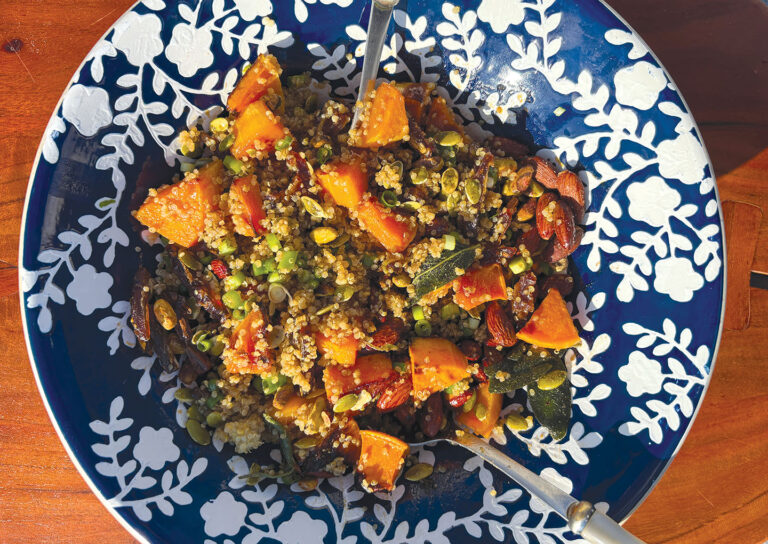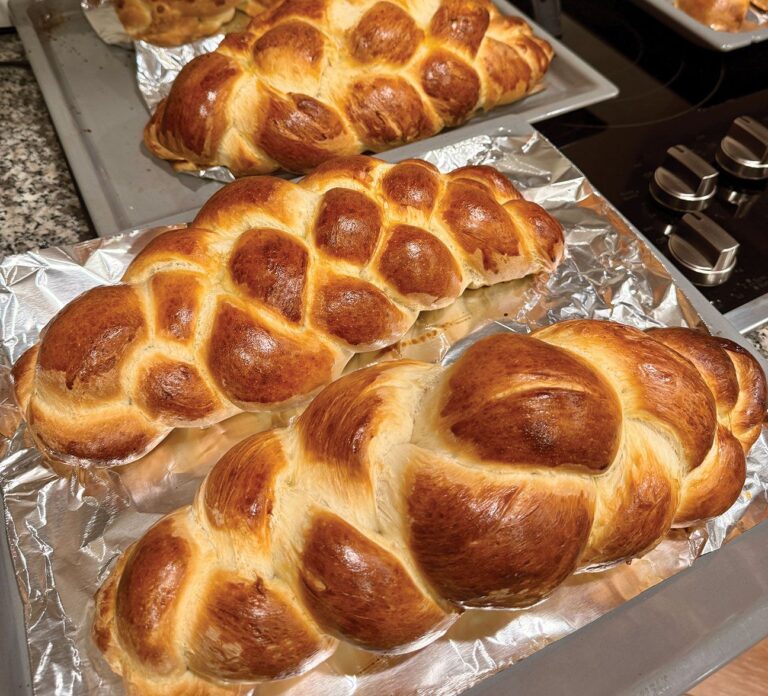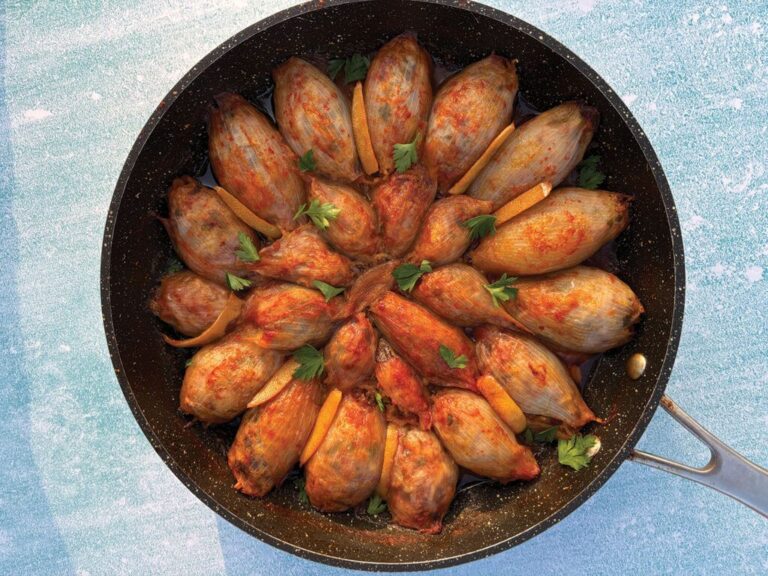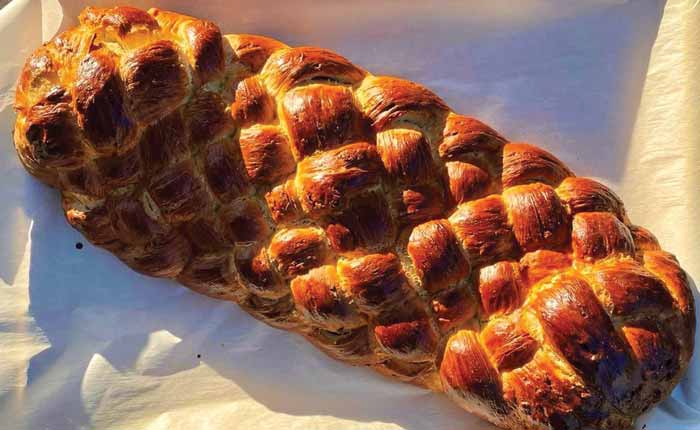Of Prayers and Grape Leaves
Grapevine leaves are the perfect festive food. A food that requires the luxury of time.
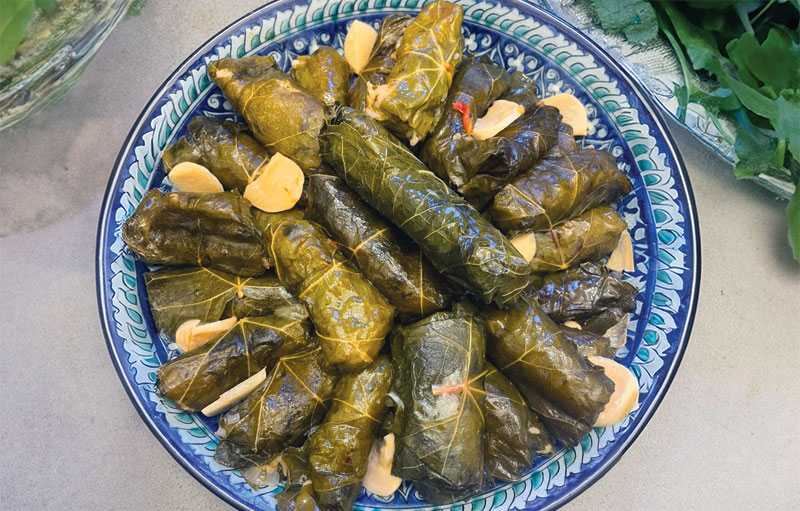
The preparation, research and publication of this article was made possible by a grant from the Memorial Foundation for Jewish Culture.
My grandmother Nana Aziza had a generous heart and a nurturing spirit. She lived her life recreating the warmth and beauty of her ancestral home in the South of Iraq. She and my Baghdadi grandfather had infinite love and patience for all their grandchildren and their lives were dedicated to transmitting tradition. This week, Rachel and I are honored to share our column with my cousin Sarah Sassoon, poet and children’s book author.
—Sharon
When I met Sarah many years ago, I instantly named her “Smart Girl.” She has become my friend and I love connecting with her when I visit Jerusalem.
Stuffed vegetables are a common dish for Sukkot and Simchat Torah, a hallmark of the harvest. Stuffed grape leaves are especially resonant, since they resemble the rolled scrolls of the Torah. —Rachel
Stuffed vegetables are a common dish for Sukkot and Simchat Torah, a hallmark of the harvest. Stuffed grape leaves are especially resonant, since they resemble the rolled scrolls of the Torah.
What are rolled grapevine leaves called in Judeo-Arabic?
I realize I don’t know what my Iraqi grandmother called them.
I am on a quest for her voice. I believe it can be found in the foods that she cooked. So here I am, under the beating sun, picking fresh vine leaves from a lush arbor laced with long tendrils, heavy with green and purple grapes.
This Jerusalem community garden is an act of defiance. Cartoonish greedy developers cannot build on land with fruit trees. So there are many trees here — crab apple, pomegranate, apricot, plum, lemon and lime. The wild artichokes are in bloom. I stretch for fresh grape leaves. Protective leaves, army green leaves.
The air is full of the sounds of morning bird song, honking cars and children wearing backpacks, skipping to school. We are in a war. The only reason that the roads are busy, that children can skip to school and that I can pick grape leaves, is our army.
Here in Israel, many of our fathers, husbands, sons and daughters are serving, including my son. We are in the days of awe, reflection, inner questioning. Why do they hate us? Who do I hate? What is stuck inside me, besides my breath?
I pick leaves the size of my palm. I search for bigger leaves the size of my son’s hands.
I pick the leaves and think, My son is protecting us when my job as a mother is to protect him.
The last time I made rolled vine leaves, my son was between his rounds in Gaza, sick with fever and sprawled on the couch.
Blanch the leaves like rough, hard truth in boiling water with a bit of salt, watch them change from uniform green to camouflage fatigues. I freeze half the batch of leaves and brine the rest.
I sit at my dining table with four Iraqi and Sephardic Jewish cookbooks and debate the ingredients. Which will taste like my grandmother’s vine leaves? I end up creating my own version. Vegetarian with pine nuts. I crinkle my nose, remembering that my grandmother mostly made hers with ground beef. I strive to recover her flavors, yet I am already digressing/transgressing her memory.
I seek harmony. I form the base sauce with moon-shaped slices of lemon and tomato and garlic in my largest deep frying pan. I admire the colors, the circles of wholeness.
My grandmother learned to roll her leaves with her mother, in the small southern village of Al Uzair in Iraq, where Ezra the Scribe is buried. They would have sat at a low table, takht on wooden benches, with aunts who were visiting, cousins, and close friends. I sit alone. The Babylonian Jewish world of my grandmother has disappeared.
I chop onions, parsley, fresh mint picked from the garden. I add fresh diced lemon. I soak the rice in water for ten minutes. I rinse and pour out the water, over and over again. It feels like I am rinsing more than rice. Something is filling up, emptying and filling up again inside of me.
Alone, I sit and pack the vine leaves, veins side up. I feel my grandmother next to me.
I want to make it taste like my grandmother’s food. I want my children to know her. Know how she prayed for me, for them, as she rolled her hopes into vine leaves.
In Iraqi Jewish culture, you do not talk about bad or sad things. No death, no sickness, no expulsions. Instead of dwelling on sad memories, my grandmother packaged grapevines like suitcases of blessings, an abundance of suitcases in contrast to the lone bag they were allotted when they left Iraq. For herself, my grandfather and their five children. Their single passport stamped “No Return.”
She always described Iraq as the Garden of Eden, not as the country that expelled 120,000 Jews. Like she only knew plenty in her life, instead of frozen bank accounts and dispossession.
As I research, I realize that she wrapped her story in vine leaves, kubbeh balls, sambusek and endless simmering stews. She fed me her story. Once upon a time, in 1917, a third of Baghdad was Jewish. Today, only three Jews live in Baghdad.
By not telling me, she illustrated everything that was important, what you cook now, whom you feed now. You cannot hide feelings from a child, or the source of the food. Rolling the vine leaves I learn everything that she wanted to protect me and my children from, especially homelessness, rootlessness.
We are building our sukkah of metal poles and fabric walls on the Astroturf that is my boys’ soccer field. The roof is a mix of bamboo and palm, spaced so we can see the stars. The sides of the entrance are decorated with welcoming palm fronds, just like my father decorated our sukkah in Sydney. The symbol of a Baghdadi sukkah.
Every Sukkot, I wonder if and how they built sukkahs in the Ma’abarot, the refugee camps where my grandparents and almost a million Middle Eastern refugees were placed in Israel, alongside European Holocaust survivors. What is the meaning of a temporary festive booth when you live in a tent that is meant to be temporary, but isn’t.
The immigrants worried about food, my father’s cousin tells me. Nothing else mattered, not even religion. He was five years old when he left Al Uzair in 1951.
Today in Jerusalem, my husband, my children and I build our sukkah with a view of the stars. It’s a temporary structure built with faith and deep gratitude that we do not live in a tent. Gratitude that my grandparents and my father worked hard to not look back with tears but to build forward.
Over the seven festive days, the green fronds of the sukkah will fade to a dried ochre color. This year, I am dreading the last day of Shemini Atzeret, the eighth day when we don’t have to sit in the sukkah. Simchat Torah, the day that we celebrate the Torah, is the day that we failed to protect ourselves. The day that my son donned his uniform. The day that my husband raced him to his base, even though we don’t drive on festivals, even though there were sirens blaring as thousands of rockets fell. I could not protect him from going to war.
Grapevine leaves are the perfect festive food. A food that requires the luxury of time. Time has a new meaning with this war.
I fold the blanched vine leaves carefully, over the rice, pine nuts, onion, parsley and mint mixture. Pack them like small parcels of safety. I whisper words, hum psalms, so each vine leaf becomes a package of prayer. — Protect my son. He is in the North.
I am scared of the tomato sauce. From experience, I know how difficult it is to achieve the delicate balance of lemony sweet and sour, joy and fear, light and darkness. The fragile line between life and death.
I am nervous to cook the beautifully rolled leaves set in the pan on top of the tomato, lemon, garlic base. I dart between the books trying to figure out which will taste the most like my grandmothers. None is right. One is too tomatoey. One too sweet. I feel like I’m on my own as I mix the juice of 2 lemons, 2 cups of vegetable broth, and a touch of date syrup. I doubt my grandmother used vegetable broth, but I knew it would add the exact nuanced rich flavor, like hers.
Why am I so sad? Because I love my son, and I have let him go to war. Because I can’t wrap him up anymore. I have sent him into the line of fire for our people.
So much is alone now. I concentrate on remembering the exact taste of lemon and tomato, the taste of our love and sorrow.
I pour the sauce over the leaves and cover it with a big lid that almost fits the giant mouth of the pan. Slowly, I bring the pan to the boil, and pray. I try the sauce. I add more salt. I try it again, pulling a grape vine out this time to cut through. The leaf is tough, not cooked through.
I pray as the rolls of vine leaves simmer that the leaves soften. I pray that my son is safe in body and spirit.
And I feel whole, as I turn the stove off. Did the antioxidant properties of the vine leaf help fight my depression? Or is it because I have rolled hopes, dreams and ideals, incorporating my grandmother’s story of not looking back? I have rebelled against the narratives of hate and despair.
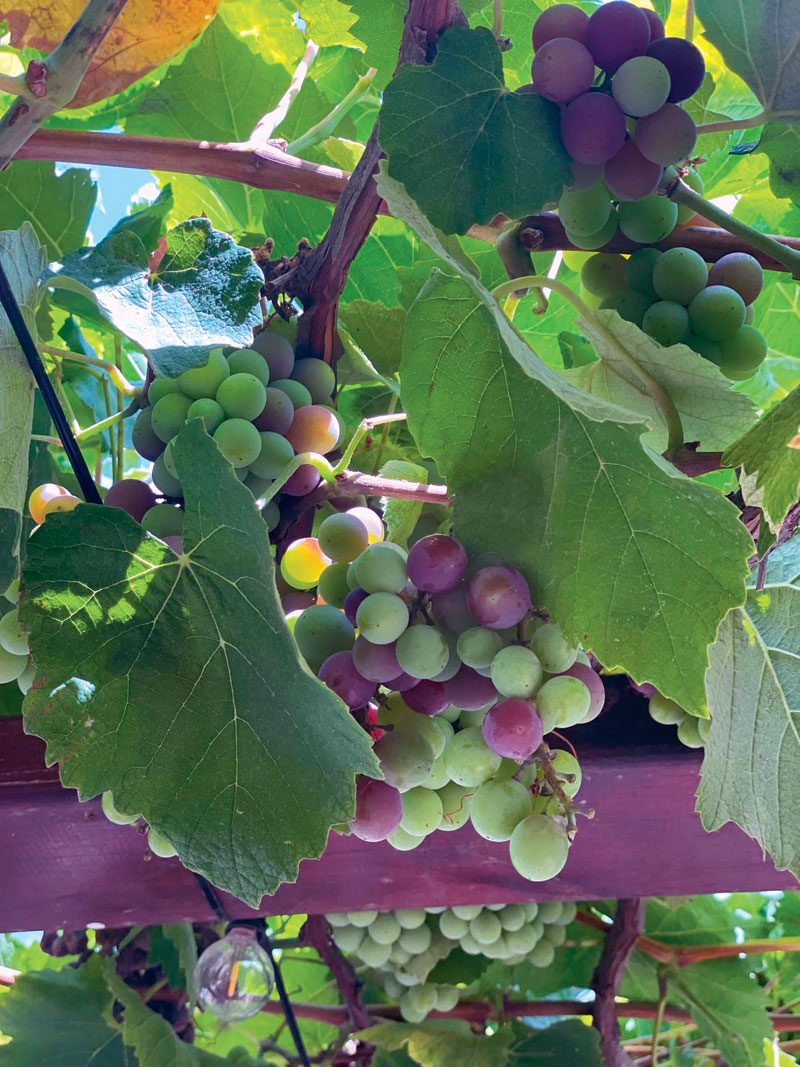
I attend the funeral of a fallen soldier. Tal Dror was killed by an Iraqi drone in the North. I am sorry I could not protect you, his mother says. His father says, I love this country. I am not angry at anyone. The aunt says, Sorry Tal. Sorry for what was asked of him. The military funeral service ends with a prayer of forgiveness that the rabbi chants on all our behalf. We weep. We confess how sorry we are to our youth whom we cannot protect. Who must protect us.
G-d knows I don’t know what the future holds. My husband reminds me I am not G-d.
I have learned the preparation time of rolled grape vine leaves extends beyond the cooking. The flavors need to settle overnight. It is like making wine. A grape destiny of patience, process and care. This is the method of Iraqi Jewish cooking. One of the deepest secrets my grandmother’s hands teach me. To cook takes time, like growing a child.
The ceramic plate full of rolled vine leaves is now empty. Now it’s entered a deeper place. A memory. More than stuffed grape leaves. The Middle Eastern Jewish story of love and resilience.
When I revisit the arbor of vines, I learn from the Moroccan gardener that Iraqi rolled grapevines are called Yabragh. I hear the word Yifrach, which in Hebrew means to blossom, bloom. In Arabic, it’s pronounced I’frah and means joy and happiness.
May our divine walls of protection last. May the divine ceiling which stops hundreds of Iranian rockets hold. May our hostages be freed. May our children be safe. May he come home—In’shallah, let it be G-d’s will.
Yabragh – Iraqi Jewish Rolled Vine Leaves Recipe
30-50 grape leaves, fresh or store bought
Base:
4 large Roma tomatoes, sliced into rounds
2 lemons with rind, sliced into rounds
6-8 garlic cloves, sliced
Filling:
2 cups of basmati rice, soaked for 10 minutes, rinsed and drained
3 medium onions, finely chopped
1 large bunch mint
1 large bunch Italian parsley
2 medium lemons, peeled, seeded and chopped
2 cups roasted pine nuts or 1 lb ground beef or lamb
4 large Roma tomatoes, finely chopped
1/2 cup extra-virgin olive oil
1 tsp salt
1/2 tsp pepper
Sauce:
1/2 cup fresh lemon juice
2 Tbsp tomato paste
1 Tbsp date syrup or sugar, to taste
2 cups vegetable stock or water
1/3 cup extra virgin olive oil
1 1/2 tsp salt
In a medium pot, blanch fresh grape leaves, in boiling water with salt for about 1-2 minutes. Then plunge into cold water and drain.
Place the tomato slices and lemon rounds and pieces of garlic in a large deep frying pan, making sure the bottom is well covered.
In a large bowl, combine the rice, onions, mint, parsley, lemon, pine nuts or meat, tomato, olive oil, salt and pepper.
Place the open vine leaf with the vein side up. Depending on the size of the leaf, place a tablespoon or a teaspoon of stuffing in the middle, then fold the edges and roll until the end. Place rolled vine on the base. Pack the rolls tightly, until the pan is full. Then start the next layer.
In a medium bowl, combine the lemon juice, tomato paste, date syrup, stock, olive oil and salt. Then pour over vine rolls, ensuring all are covered with liquid.
Bring to a boil, then cover and simmer for 30-45 minutes or more, until the liquid is absorbed. Add more salted water, if needed.
Allow rolls to sit until slightly cooled. Remove the rolls from the pan, reserving the base ingredients to use as decoration. Notes
The flavors deepen overnight, so best eaten the next day.
Serve warm or at room temperature.
Store leftovers in a tightly container in the refrigerator.


